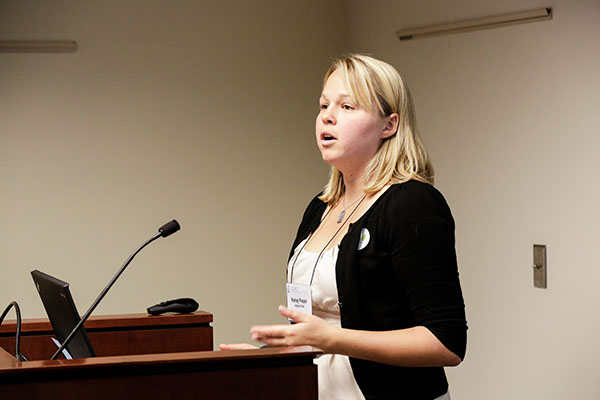Dr. Kelsey Pieper Joins Civil and Environmental Engineering Faculty

In Fall of 2019, the Department of Civil and Environmental Engineering welcomed its newest faculty member, Assistant Professor Dr. Kelsey Pieper. Pieper joins the Water, Environmental, and Coastal Systems wing of the department, adding her expertise to the program’s large and growing faculty. Her interdisciplinary research sits at the nexus of water quality, infrastructure, and public health in communities under-served by science and engineering.
Prior to joining Northeastern University, Pieper worked as a researcher at Virginia Tech, identifying areas vulnerable to lead in water and providing outreach and interactive learning tools to support lead mitigation and intervention. The issue is of pressing concern. While many in large urban areas benefit from the latest in water treatment practices, those in rural communities often receive their water from systems that are under-resourced or sometimes unregulated. “Even for small municipalities that are regulated by the US Environmental Protection Agency, approximately 25% violate at least one health-based drinking water standard, which hints at the magnitude of problems likely experienced by the 47 million consumers on unregulated private wells,” says Pieper. “For these residents, ensuring safe drinking water is solely the responsibility of the well user.”
Flint, Michigan and the Importance of Citizen Science
Pieper aims to empower communities reliant on such small municipal systems or unregulated private wells by utilizing citizen science to document lead in drinking water. Working alongside residents in Flint, Michigan, she and her colleagues helped reveal the full scope of the city’s water contamination. Even more sobering, their research indicates that many of the nation’s unregulated wells have lead levels virtually identical to those measured at the height of the Flint Water Crisis. With the public becoming increasing concerned about lead in drinking water, her work has broadened to evaluate commonly recommended household lead in water remediation strategies. “We are developing evidence-based exposure reduction guidelines and outreach strategies, with a focus on vulnerable low-income, minority, rural, and limited English proficiency communities,” says Pieper.
Natural disasters can also have a profound effect on our drinking water. Pieper researches ways in which severe storms can affect water supplies by examining drinking water quality and recovery needs after hurricanes and severe flooding events. She has studied post-disaster water systems in Louisiana (2016 flooding), Virginia (Hurricane Matthew), Texas (Hurricane Harvey), Florida (Hurricane Irma), Puerto Rico (Hurricane Maria), and North Carolina (Hurricanes Florence and Michael). As climate change makes such weather events more severe and frequent, her research will be crucial to designing resilient and sustainable community water systems. “Our research is uncovering drinking water problems throughout the US and spurring changes in public health policies and regulatory oversight,” says Pieper.
Urban Engineering at Northeastern
Urban engineering is a strategic effort at Northeastern to center civil and environmental engineering instruction and research in the critical interdisciplinary areas of infrastructure security, environmental health, and sustainable resource engineering. Kelsey Pieper’s interdisciplinary work examines the complex way in which the environment, built infrastructure, public policy, and prevailing social factors affect human health.